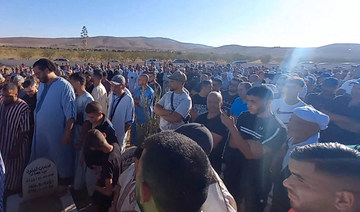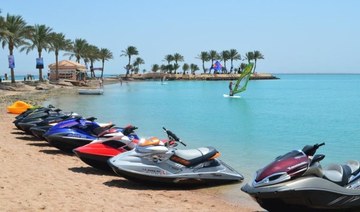ALGIERS: Algeria said Sunday its security forces had opened fire this week after a group of jet skiers from Morocco ignored warning shots and refused to comply with orders to stop.
Lawyers for two men shot dead in the incident plan to file a complaint in France. One was French-Moroccan and the other held a residence permit in France.
“During a security patrol inside our territorial waters, a coast guard unit intercepted on Tuesday at 7:47 p.m. (18:47 GMT), three jet skis that clandestinely entered our territorial waters,” a defense ministry press release said.
“After issuing an audible warning and ordering them to stop several times, the suspects refused to comply and fled,” it added of Tuesday’s incident in which two tourists were killed.
The defense ministry said that after several warning rounds, “shots were fired, forcing one of the jet skis to stop, and the other two fled.”
The ministry said the shootings happened “because of increased activity by drugs-trafficking gangs and organized crime” in the border zone, and because of “the obstinacy of those on the jet skis.”
The statement said one body was recovered on Wednesday, “of an unidentified man with a gunshot wound.”
His body was taken to Tlemcen for an autopsy, it added.
The defense ministry statement said people should “not pay attention to false information that aims to sully the honorable image of the Algerian forces.”
Reports from Morocco said French-Moroccan tourist Bilal Kissi, 29, and his Moroccan cousin Abdelali Mechouar, 40, were killed.
A third man, Smail Snabe, was wounded and detained in Algeria, according to media reports in Morocco on Friday.
Kissi’s brother Mohamed, who had also been in the group, said they got lost and ran out of fuel after leaving the Moroccan resort of Saidia, near the border with Algeria.
He said he managed to leave the area after the incident and was picked up by the Moroccan navy.
Bilal Kissi’s body was recovered on Saidia beach on the Moroccan side of the border.
Saidia is a popular Moroccan summer resort known for its long beach and water sports.
Kissi was buried on Thursday in Bni Drar village near Oujda, in the presence of dozens of relatives.
Sunday’s statement from the defense ministry was the first official reaction from Algeria to Tuesday’s incident.
In Morocco, the prosecutor’s office in the city of Oujda has opened an investigation, a judicial source told the official Moroccan news agency MAP on Friday.
The family of the two tourists killed are to launch a legal action in France, their lawyers announced on Sunday.
Hakim Chergui, who is acting for the families of the victims, said the legal action would be submitted on Monday or Tuesday.
They are accusing the Algerian authorities of aggravated murder, attempted aggravated murder, the hijacking of a vessel and failure to assist a person in danger.
The break in diplomatic relations between Morocco and Algeria “does not justify the committing of the least crime and even less so the impunity of those responsible,” said a statement from the lawyers.
It was issued shortly before the Algerian defense ministry statement was released.
It comes at a time of increased tensions between Algeria and Morocco, exacerbated by antagonism over the disputed Western Sahara territory.
The border between the two North African countries has been closed since 1994, and Algiers severed diplomatic ties in August 2021, accusing Morocco of “hostile acts” — a decision Rabat called “completely unjustified.”
There has been no official statement yet from Rabat about the incident.
However, Morocco’s state-run National Human Rights Council (CNDH) condemned the use of live fire by the Algerian coast guard against “defenseless citizens, instead of helping people lost at sea.”
It said this was “a grave violation of international norms.”
The CNDH also said that a third person was still in intensive care in Oujda, without naming him.
It said Snabe had been “sentenced to 18 months” in prison in Algeria.



























